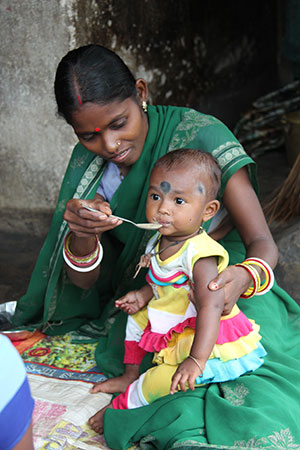
In their" target="_blank"> seminal framework of the causes of undernutrition, the United Nations Children’s Fund (UNICEF) identified three underlying causes of undernutrition: inadequate care and feeding practices, household food insecurity, and an unhealthy household environment and inadequate health services. All are behavior related, making behavior change paramount to the prevention of stunting and anemia.
To frame SPRING’s work in SBCC for maternal, infant, and young child nutrition (MIYCN), we conducted a review of SBCC strategies and theories, as well as a systematic literature review exploring the effectiveness of SBCC approaches in changing priority MIYCN practices, which were drawn from The Lancet’s 2008 and 2013 Maternal and Child Nutrition Series, the WHO’s Essential Nutrition Actions document (2013), the WHO’s e-Library of Evidence for Nutrition Actions, and UNICEF’s report Improving Child Nutrition: The Achievable Imperative for Global Progress. SPRING considers certain hygiene practices to be of critical importance to nutrition outcomes and promotes behaviors related to handwashing—at a minimum—for all of our MIYCN activities.
SPRING promotes improved MIYCN and hygiene at every level of the ecological model, including systems, national policies and strategies, community, household, and individual levels. SPRING has been directly involved with developing government-led nutrition and SBCC strategies in a number of countries, health systems capacity building for nutrition, and community-led efforts to promote MIYCN and hygiene. SPRING has also spearheaded a multi-year engagement with the Nigerian Federal Ministry of Health and UNICEF to evaluate the national adaptation of the Community Infant and Young Child Feeding (C-IYCF) Counselling Package that is being scaled up in Kajuru LGA.